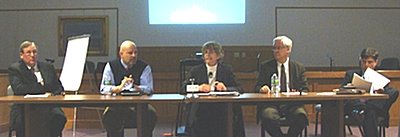- By Marcia E. Lynch, Dan Veaner
- News
 Print
Print  The Tompkins County Industrial Development Agency (IDA) sponsored a session Monday to provide information and respond to questions about the proposed amendment to the payment-in-lieu-of-taxes (PILOT) agreement between the IDA and the AES Cayuga power plant in Lansing. The proposed PILOT will halve tax revenue from the plant for Lansing Schools over a four year period. About a dozen people attended the hour-long session at the Lansing Town Hall.
The Tompkins County Industrial Development Agency (IDA) sponsored a session Monday to provide information and respond to questions about the proposed amendment to the payment-in-lieu-of-taxes (PILOT) agreement between the IDA and the AES Cayuga power plant in Lansing. The proposed PILOT will halve tax revenue from the plant for Lansing Schools over a four year period. About a dozen people attended the hour-long session at the Lansing Town Hall.The 20-year agreement, which involves a valuation and a tax, and is not a tax abatement, was initiated in 2009 to address the difficult challenge of determining the appropriate and fair valuation for the facility in the volatile electric generation market. Under the PILOT, values were established every five years with the ability to revisit value after two years or for extraordinary circumstance.
Since then, County Administrator Joe Mareane noted, there has truly been a need to adapt to extraordinary change—the PILOT was negotiated and initial valuation set in 2007-08 when the economy was robust, with a major adjustment in 2010 reflecting collapse of the economy and demand for electricity, followed by another adjustment in 2011. The latest proposal, he said, adjusts for continuing economic challenges affecting the value of the coal-fired plant.
The proposed amendment would phase in a decrease the plant’s taxable value from the current $112.5 million to $60 million in three steps—to $86,250,000 in 2012, $74 million in 2013, and reaching $60 million in 2014. The decline would decrease the estimated tax paid by the plant from nearly $3.2 million paid in 2011 to about $1.7 million in 2014, with the Lansing School District the hardest hit.
 Monday's panel (left to right) School District Consultant Michael Coles, Tompkins County Director of Assessment Jay Franklin, IDA and Legislature Chair Martha Robertson, County Administrator Joe Mareane, Tompkins County Area Development President Michael Stamm.
Monday's panel (left to right) School District Consultant Michael Coles, Tompkins County Director of Assessment Jay Franklin, IDA and Legislature Chair Martha Robertson, County Administrator Joe Mareane, Tompkins County Area Development President Michael Stamm.“This is something we wish we didn’t have to deal with, but it is the reality of this facility,” Mareane said.
Because of the bankruptcy of AES Cayuga, the PILOT amendment would require approval by the bankruptcy court, but Mareane said there is no reason to believe that the court will not approve the PILOT, and the negotiating team is being advised by the Bankruptcy Council. The PILOT would transfer to a new owner of the plant.
The amendment would no longer provide for reopening annual negotiations as part of the agreement. Although negotiations would not reopen, IDA Chair Martha Robertson said the parties would still plan to meet with the owners of the plant once a year for the next three years to discuss the plant’s status.
 AES Cayuga Plant Manager Jerry Goodenough
AES Cayuga Plant Manager Jerry GoodenoughIn response to questions, officials noted pricing, supply, and the effects of a worldwide market all contribute to the plant’s decline in valuation—that this region has the ability to produce much more energy than needed, and the volume is being taken up by natural gas plants that have the monetary advantage.
Wednesday IDA representatives were back in Lansing for a public hearing. Just over a dozen people showed up, and a handful told the IDA what they think about the proposed amended PILOT.
Lansing resident Walker Reynolds said that valuing the plant at $81 million is too low, and urged the IDA to vote down the agreement. Lansing Councilman Ed LaVigne noted the inevitability of the devaluation, saying that the community must move forward with new initiatives to make up the loss of tax revenue. Mike Coles, a consultant to the Lansing School District, said that the numbers are accurate, and that negotiators 'turned over every stone' in determining a fair value for the plant. Resident Ed Leonard asked where Lansing will get the money to pay for the losses to Lansing school revenues, and where taxpayers will get the money to pay more when the plant pays less.
Robertson said that the public comment period will continue through February 23rd, when the IDA will meet at 3:30pm at the Tompkins County Public Library to hear more comments and to vote on the contract.
v8i6



